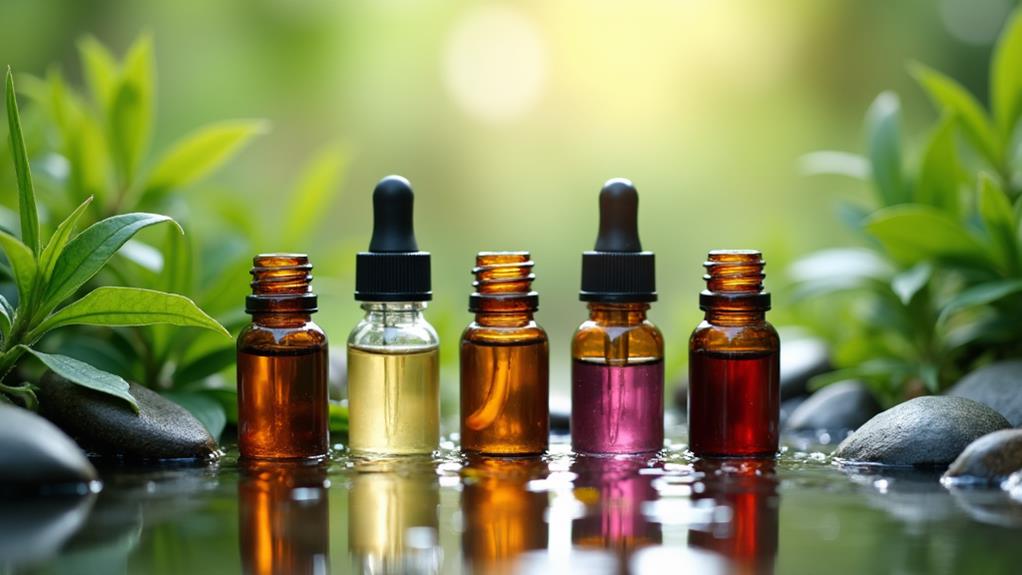You’re likely familiar with the numerous benefits of essential oils, but with so many options available, it can be overwhelming to choose the right ones. That’s why we’ve narrowed down the top picks from Ripple’s impressive lineup. You’ll find some of the most popular and versatile oils on the list, including Lavender, Peppermint, and Tea Tree. But what sets Ripple’s oils apart from the rest, and which other seven oils made the cut? By exploring the unique properties and uses of each, you’ll discover how these high-quality oils can elevate your self-care routine and promote overall well-being.
Key Takeaways
- The best Ripple essential oils include lavender oil for its calming and therapeutic properties.
- Peppermint oil is a top choice for its natural analgesic and anti-inflammatory properties.
- Tea tree oil is a popular Ripple essential oil for its antimicrobial and antifungal properties.
- Eucalyptus oil is a valuable addition to natural health routines for its decongestant and anti-inflammatory properties.
- Frankincense essential oil is a top choice for promoting relaxation and reducing inflammation, with a rich history in traditional medicine.
Lavender Essential Oil
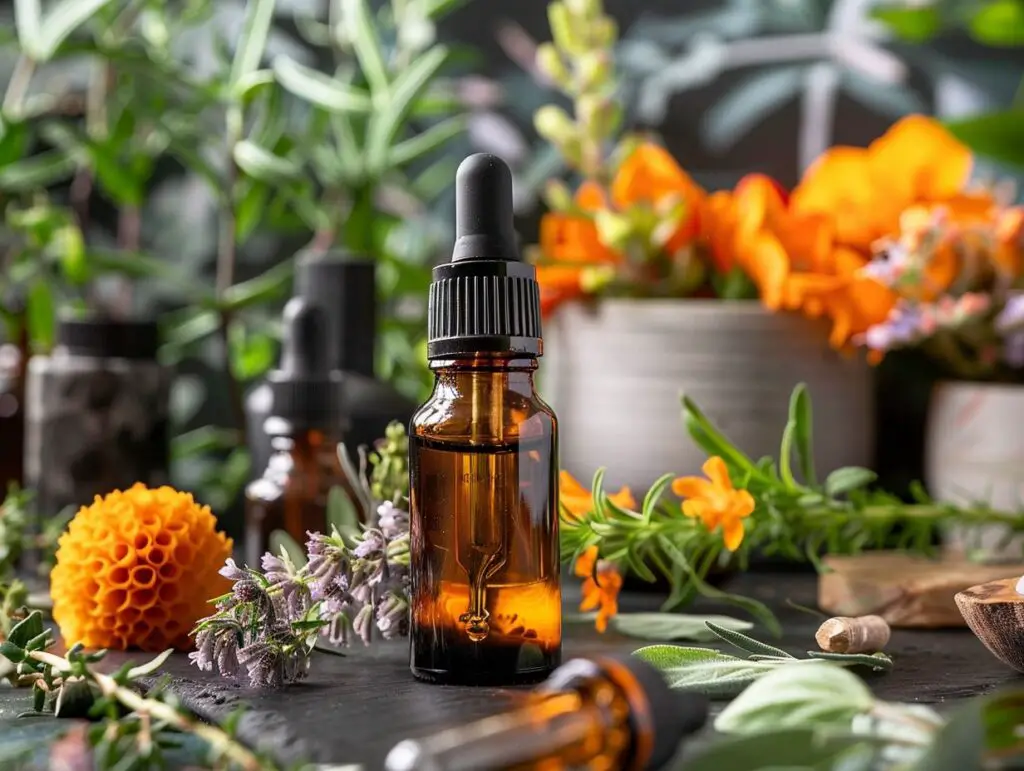
Lavender essential oil, extracted from the flowers of the lavender plant (Lavandula angustifolia), is a popular choice for its calming and therapeutic properties.
You can attribute this oil’s effectiveness to the specific conditions under which lavender is cultivated. Lavender cultivation often involves planting the crop in well-drained soil with high altitudes and low humidity.
This environment allows for the ideal production of linalool and linalyl acetate, the two compounds responsible for lavender’s calming effects.
When you use lavender essential oil, you’re exposing yourself to these compounds, which work to regulate your nervous system.
The calming effects can be seen in reduced anxiety and stress levels, as well as improved sleep quality.
Lavender essential oil is often used in aromatherapy, where its vapors are inhaled to stimulate the brain’s emotional responses.
To get the most out of lavender essential oil, you need to verify that the oil is of high quality and extracted using a suitable method, such as steam distillation.
This guarantees that the resulting oil is potent and capable of delivering the desired therapeutic benefits.
Proper use of lavender essential oil can lead to a noticeable improvement in your overall well-being.
Peppermint Oil Benefits
In conjunction with a balanced lifestyle, incorporating peppermint essential oil can substantially contribute to your overall health and wellness.
As a natural analgesic and anti-inflammatory agent, peppermint oil can help alleviate headaches and muscle tension. Its invigorating scent also makes it an effective energizer, boosting your mental focus and alertness.
This oil can be used topically or inhaled to stimulate circulation and oxygenation of the brain.
Peppermint oil benefits also extend to digestive health.
Its natural antispasmodic properties can help soothe irritable bowel syndrome (IBS) symptoms, such as bloating, cramps, and diarrhea.
In addition, peppermint oil’s antimicrobial properties can help combat bacterial and viral infections that may be contributing to digestive issues.
For Peppermint relaxation, try adding a few drops to your bathwater or inhaling it before bed.
The oil’s calming effects can help reduce stress and anxiety, promoting a restful night’s sleep.
Always dilute peppermint oil with a carrier oil before applying it to your skin, as it can be quite potent.
Tea Tree Oil Uses
Tea tree oil, extracted from the leaves of Melaleuca alternifolia, is widely used for its antimicrobial, antifungal, and antiseptic properties. You can harness its power to address various skin issues and promote hair care. When using tea tree oil, always dilute it with a carrier oil to avoid skin irritation.
| Benefits | Uses |
|---|---|
| Soothes acne | Apply 2-3 drops of tea tree oil to a cotton swab and dab it onto acne-prone areas |
| Relieves itchiness | Mix 5-7 drops of tea tree oil with coconut oil and apply it to the affected area |
| Promotes hair growth | Add 5-7 drops of tea tree oil to your shampoo to stimulate hair growth and reduce dandruff |
You can also use tea tree oil to treat fungal infections, such as athlete’s foot and ringworm. For skin issues, tea tree oil can be used as a natural remedy for minor cuts and scrapes. However, if you have sensitive skin, start with a patch test to verify you don’t have any adverse reactions. By incorporating tea tree oil into your skincare and hair care routine, you can experience its numerous benefits and enjoy healthier, more radiant skin and hair.
Eucalyptus Oil Properties
When you explore eucalyptus oil properties, you’ll discover a multifaceted oil with numerous benefits, aromatic characteristics, and specific usage guidelines.
You’ll learn about the oil’s decongestant, anti-inflammatory, and antimicrobial properties that make it a valuable addition to your natural health routine.
As you examine its properties, you’ll also become aware of the necessary precautions to take when using eucalyptus oil to guarantee safe and effective application.
Eucalyptus Oil Benefits
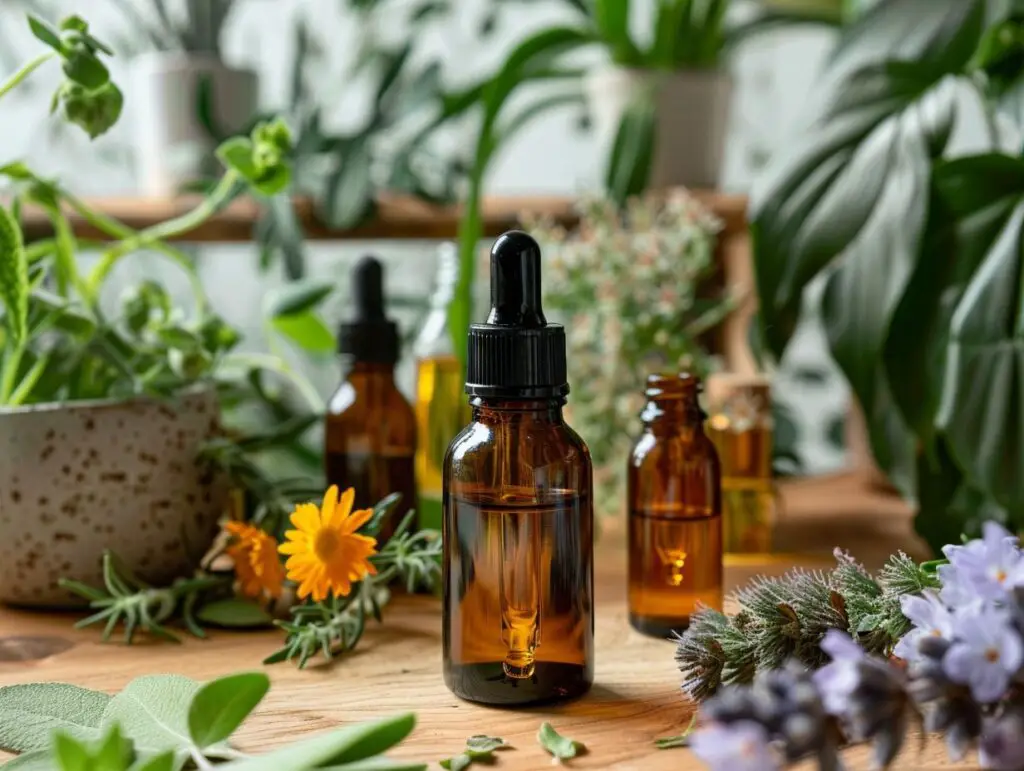
Eucalyptus oil, derived from the leaves of the eucalyptus tree, boasts a multitude of benefits that make it a staple in many natural health and wellness practices.
You can use it to alleviate respiratory issues, such as chest congestion and sinus pressure, by inhaling it through steam inhalation or applying it topically to the chest area.
This is due to its decongestant properties, which help to thin mucus and make it easier to expel.
When you use eucalyptus oil, it can also help to reduce inflammation and ease muscle tension.
It has analgesic and anti-inflammatory properties, making it effective in relieving pain and discomfort associated with arthritis, fibromyalgia, and other inflammatory conditions.
Additionally, eucalyptus oil has antimicrobial properties, which can help to prevent the growth of bacteria, viruses, and fungi.
You can incorporate eucalyptus oil into your daily routine by adding a few drops to your bath water, mixing it with a carrier oil for a massage, or using it in a diffuser.
Always dilute it with a carrier oil and perform a patch test before using it on your skin to avoid any adverse reactions.
Aromatic Properties Explained
When evaluating the scent classification of eucalyptus oil, you’ll notice it falls under the fresh and herbaceous categories. This classification is based on the oil’s dominant aromatic compounds and their respective boiling points. Here’s a breakdown of the key aromatic compounds found in eucalyptus oil:
| Compound | Percentage |
|---|---|
| Cineole | 70-85% |
| Limonene | 5-10% |
| Alpha-pinene | 2-5% |
| Beta-pinene | 1-3% |
| Sabinene | 1-2% |
These compounds work in harmony to create the distinctive aroma of eucalyptus oil. As you explore the world of essential oils, understanding the aromatic properties of each oil can help you make informed decisions about their uses and potential benefits. By recognizing the scent classification and dominant compounds of eucalyptus oil, you can appreciate its unique characteristics and applications.
Usage and Precautions
Proper essential oil storage is also vital to maintain the quality and potency of eucalyptus oil.
Store it in a cool, dark place, away from direct sunlight and heat sources. Use dark glass bottles with tight-fitting lids to prevent degradation.
When blending eucalyptus oil with other essential oils, follow oil blending safety guidelines to avoid adverse reactions.
Research the properties and contraindications of each oil before combining them. Be cautious when using eucalyptus oil with other strong oils, as they can interact and exacerbate skin irritation or allergic reactions.
Always perform a patch test before using a new blend, and consult with a healthcare professional or certified aromatherapist if you’re unsure about any potential interactions.
Frankincense Essential Oil
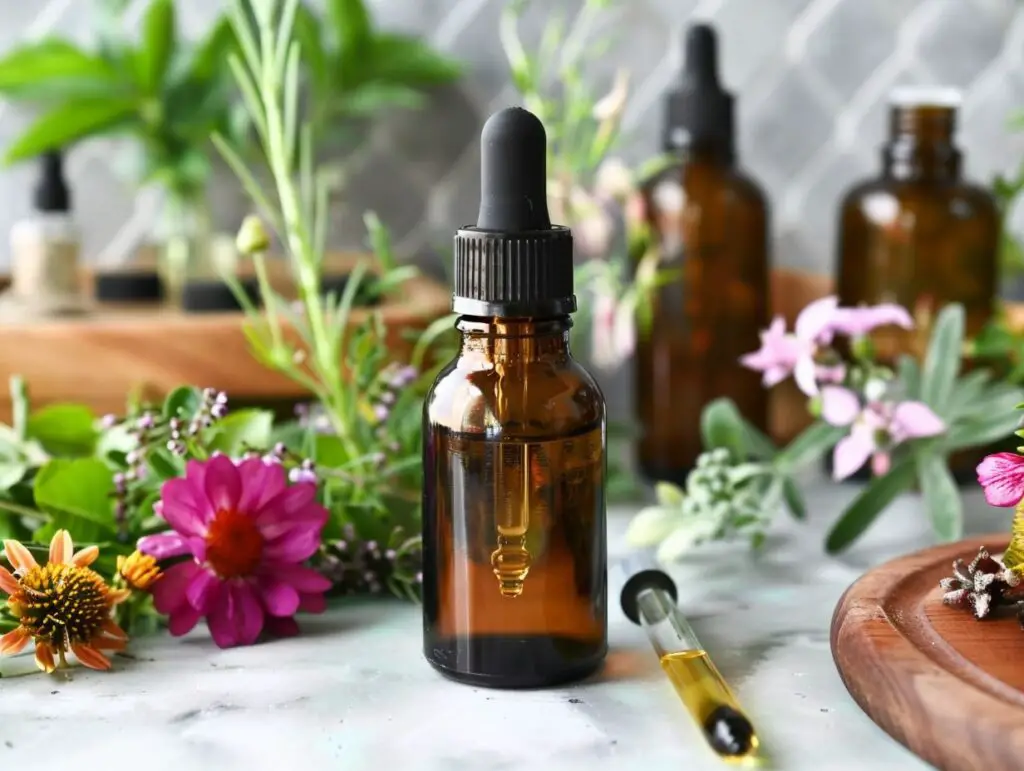
Harmony in aromatherapy often begins with the selection of a versatile essential oil, and Frankincense Essential Oil is no exception.
You’ll find that Frankincense has a rich history, dating back thousands of years to ancient civilizations in the Middle East and North Africa. It was highly valued for its medicinal, spiritual, and cultural significance.
This resin-based oil is extracted from the Boswellia tree through a process of steam distillation.
When using Frankincense Essential Oil, you can incorporate it into various recipes to promote relaxation and reduce inflammation.
One popular recipe is a calming massage oil blend, combining 5 drops of Frankincense with 2 tablespoons of carrier oil. Another recipe is a soothing skin serum, mixing 3 drops of Frankincense with 1 teaspoon of jojoba oil.
You can also add Frankincense to your diffuser, blending it with other oils like lavender and bergamot to create a peaceful atmosphere.
With its woody, earthy aroma, Frankincense Essential Oil is an excellent addition to your aromatherapy collection.
Geranium Oil Effects
When you incorporate geranium oil into your wellness routine, you may experience emotional balance benefits that help alleviate stress and anxiety.
This essential oil has also been used to support physical health, with its antimicrobial and anti-inflammatory properties making it a potential natural remedy for wound care and skin issues.
Emotional Balance Benefits
Utilizing geranium essential oil in your daily routine can have a profound impact on achieving emotional balance.
As you incorporate this oil into your life, you’ll notice its effects on your emotional well-being. Geranium essential oil is known for its ability to promote emotional calmness strategies, helping you manage stress and anxiety.
When you’re feeling overwhelmed, geranium oil’s stress relief techniques can help calm your mind and body.
By promoting relaxation and reducing anxiety, this oil can be a valuable tool in your emotional wellness journey.
Some benefits of using geranium essential oil for emotional balance include:
- Reducing anxiety and stress levels
- Promoting relaxation and calmness
- Balancing hormones and emotions
- Improving mood and overall well-being
- Enhancing emotional resilience and coping abilities
Physical Health Uses
Geranium oil’s therapeutic properties extend beyond emotional balance, and its effects on physical health are just as remarkable.
You can incorporate geranium oil into your pain relief methods to alleviate muscle tension, inflammation, and menstrual cramps. This oil has anti-inflammatory properties that help reduce swelling and ease pain. You can mix a few drops of geranium oil with a carrier oil and apply it topically to the affected area for relief.
Geranium oil also plays a significant role in your skin care routines.
Its antiseptic and antifungal properties help prevent the growth of bacteria and fungi, reducing the risk of acne and other skin infections. You can add a few drops of geranium oil to your facial wash or moisturizer to promote healthy skin. Additionally, geranium oil’s antiseptic properties make it effective in wound healing by preventing infection and promoting tissue repair.
Rosemary Oil Advantages
Rosemary essential oil offers numerous advantages that can positively impact your health and wellbeing.
As a natural remedy, it has been used for centuries to improve cognitive function, memory, and concentration.
Rosemary aromatherapy can help stimulate your mind, making it easier to focus and stay alert.
You can incorporate rosemary essential oil into your daily routine to reap its benefits.
Here are some advantages of using rosemary essential oil:
- Improves cognitive function and memory retention
- Enhances focus and concentration, making it ideal for studying or work
- Relieves mental fatigue and stress, promoting a sense of calm and relaxation
- Boosts your immune system, helping to fight off illnesses and infections
- Can help alleviate symptoms of anxiety and depression, promoting a sense of well-being and balance
Lemon Essential Oil
When you consider incorporating lemon essential oil into your wellness routine, you’ll want to understand its benefits.
Usage guidelines, and necessary precautions are also important to know. As a versatile oil, lemon essential oil offers various advantages, from its antimicrobial properties to its mood-boosting effects.
To use lemon essential oil safely and effectively, it’s vital to be aware of its potential interactions and contraindications.
Benefits of Lemon
Lemon essential oil, extracted from the peel of lemons through a process of cold pressing, boasts a multitude of benefits that can enhance your overall well-being.
This oil has been widely used in aromatherapy, providing a natural way to uplift and revitalize your mind and body.
The benefits of lemon essential oil can be attributed to its high concentration of limonene, a compound that has been shown to have numerous health benefits.
Some of the benefits of using lemon essential oil include:
- Boosts immune system: Lemon essential oil has antimicrobial properties that can help to stimulate the immune system and fight off infections.
- Citrus therapy benefits: The citrus scent of lemon essential oil can help to reduce stress and anxiety, promoting a sense of calm and well-being.
- Lemon detoxification methods: Lemon essential oil can help to support the body’s natural detoxification processes, promoting the removal of toxins and waste products.
- Improves mood: The uplifting scent of lemon essential oil can help to improve your mood and reduce symptoms of depression.
- Natural disinfectant: Lemon essential oil has antibacterial properties that make it a natural disinfectant for surfaces and skin.
Usage and Precautions
To reap the benefits of lemon essential oil, you need to use it safely and effectively.
This involves following proper usage and safety guidelines to avoid adverse reactions or interactions.
When using lemon essential oil, always dilute it with a carrier oil, as it can be highly concentrated and potentially irritating to the skin.
The recommended dilution ratio is 1-3% essential oil to 97-99% carrier oil.
Proper storage is also vital to maintain the quality and shelf life of lemon essential oil.
Store it in a cool, dark place, away from direct sunlight and heat sources.
Keep the oil tightly sealed in a glass bottle to prevent oxidation and contamination.
Safety guidelines also recommend performing a patch test before using lemon essential oil, especially if you have sensitive skin.
If you experience any irritation or discomfort, discontinue use and consult a healthcare professional.
By following these guidelines, you can enjoy the benefits of lemon essential oil while minimizing the risks.
Always consult the label and manufacturer instructions for specific usage and safety recommendations.
Bergamot Oil Benefits
When incorporated into your daily routine, bergamot oil can have a significant impact on your mental and physical health.
It can:
- Reduces stress and anxiety by promoting relaxation and calming the mind
- Uplifts your mood with its fresh aromas, helping to combat depression
- Exhibits antimicrobial properties, making it effective against acne and other skin issues
- May help alleviate symptoms of insomnia and other sleep disorders
- Can be used as a natural pain reliever for headaches and muscle aches
Bergamot oil’s unique properties make it a valuable addition to your essential oil collection.
When used in moderation and diluted with a carrier oil, it can provide a range of benefits for your physical and mental well-being.
Chamomile Oil Properties
Your exploration of calming oils can continue with chamomile oil, another natural remedy with a soothing presence.
As you dig into its properties, you’ll find that chamomile oil is rich in apigenin, an antioxidant that promotes relaxation and reduces stress.
The calming effects of chamomile oil can help alleviate anxiety, making it an excellent addition to your self-care routine.
In terms of its therapeutic applications, chamomile oil has been traditionally used to treat skin inflammation.
Its anti-inflammatory properties can help soothe redness and irritation, making it an effective remedy for conditions like eczema and acne.
The oil’s antiseptic properties also make it useful for wound care, as it can help prevent infection and promote healing.
When using chamomile oil, note that it can be quite potent.
You should always dilute it with a carrier oil before applying it to your skin or using it in aromatherapy.
As with any essential oil, it is vital to consult with a healthcare professional before using chamomile oil, especially if you have any underlying medical conditions or allergies.
Frequently Asked Questions: Ripple Essential Oils
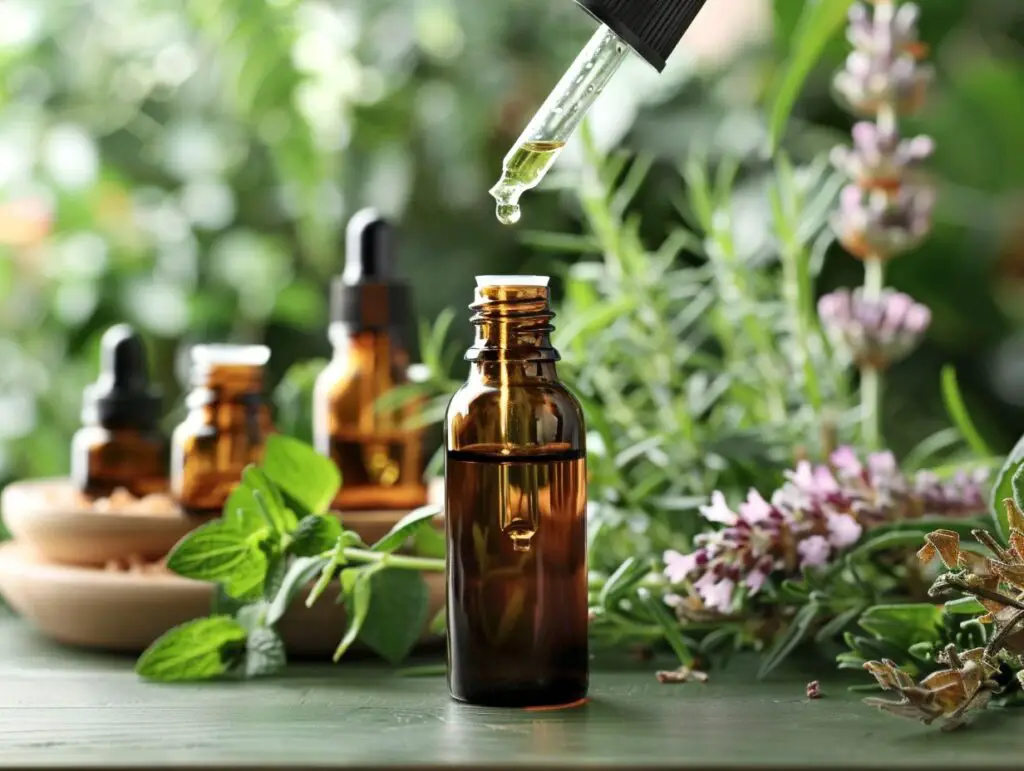
Are Essential Oils Safe for Children and Pets?
When using essential oils around children and pets, you must follow child safety guidelines and consider pet allergy concerns to avoid adverse reactions, ensuring diluted application and proper ventilation to create a safe environment.
How Do I Store Ripple Essential Oils Properly?
Cut to the chase, storing essential oils requires finesse. You should keep them in dark containers, away from direct sunlight, and maintain climate control to preserve their potency and shelf life effectively.
Can I Ingest Ripple Essential Oils for Health Benefits?
When ingesting essential oils, you must consider Ripple dosing carefully, as excessive consumption can lead to Oil toxicity. Always consult a healthcare professional to determine safe internal use, if recommended at all.
Are Ripple Essential Oils Tested for Purity and Quality?
When evaluating essential oils, you look for lab results from third-party testing to verify purity and quality. Reputable brands provide GC/MS reports, confirming their oils meet strict standards, giving you confidence in your purchase decision.
Do Ripple Essential Oils Expire or Lose Potency?
You typically find that essential oils have a shelf life of 1-3 years due to oxidation and degradation. They generally don’t have strict expiration dates, but their potency may decrease over time, affecting efficacy and aroma.
Conclusion
You’ve accessed the treasure chest of Ripple essential oils, discovering the top 10 potions to elevate your well-being. From Lavender’s calming touch to Frankincense’s anxiety-reducing powers, each oil is a key to releasing a healthier, happier you. With their scientifically-backed benefits, these oils are the perfect addition to your aromatherapy, skincare, and hair care routines. By harnessing their power, you’ll be on your way to a more balanced, vibrant life.


